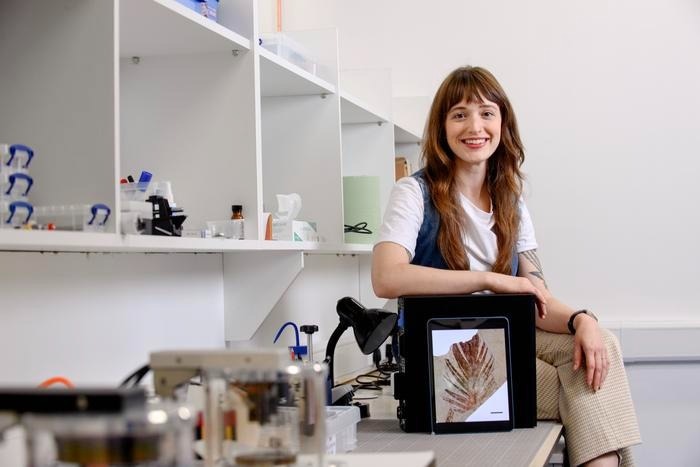Paleontologists from the University College Cork (UCC) in Ireland have made a remarkable discovery using X-Ray technology that offers fresh insights into the evolution of feathers.
 Dr Tiffany Slater pictured at the School of Biological, Earth and Environmental Sciences at University College Cork. Image Credit: Daragh Mc Sweeney/Provision.
Dr Tiffany Slater pictured at the School of Biological, Earth and Environmental Sciences at University College Cork. Image Credit: Daragh Mc Sweeney/Provision.
Previous studies have suggested that ancient feathers had a different makeup compared to the feathers found in contemporary birds. However, this new research overturns that notion by demonstrating that the protein composition found in today's feathers was also present in the feathers of dinosaurs and early birds. This discovery confirms that the chemical properties of feathers actually originated much earlier in evolutionary history than previously believed.
This groundbreaking research, which is published in the journal Nature Ecology and Evolution, was spearheaded by paleontologists Dr. Tiffany Slater and Prof. Maria McNamara from UCC’s School of Biological, Earth, and Environmental Science. They collaborated with scientists from Linyi University in China and the Stanford Synchrotron Radiation Lightsource in the USA.
In their study, the research team examined feathers that are 125 million years old, originating from the dinosaur Sinornithosaurus and the early bird Confuciusornis in China, as well as a 50-million-year-old feather from the USA.
It’s really exciting to discover new similarities between dinosaurs and birds. To do this, we developed a new method to detect traces of ancient feather proteins. Using X-Rays and infrared light we found that feathers from the dinosaur Sinornithosaurus contained lots of beta-proteins, just like feathers of birds today.”
Dr. Tiffany Slater, School of Biological, Earth, and Environmental Science, University College Cork
To better comprehend the chemical information preserved in the ancient feathers, the research team conducted experiments to gain insights into how feather proteins degrade during the fossilization process.
Modern bird feathers are rich in beta-proteins that help strengthen feathers for flight,” Dr Slater says. Previous tests on dinosaur feathers, though, found mostly alpha-proteins. Our experiments can now explain this weird chemistry as the result of protein degradation during the fossilization process. So although some fossil feathers do preserve traces of the original beta-proteins, other fossil feathers are damaged and tell us a false narrative about feather evolution.”
Dr. Tiffany Slater, School of Biological, Earth, and Environmental Science, University College Cork
This research significantly contributes to resolving a longstanding debate regarding whether feather proteins and proteins in general, can endure and remain preserved over extended periods of geological time.
Traces of ancient biomolecules can clearly survive for millions of years, but you can’t read the fossil record literally because even seemingly well-preserved fossil tissues have been cooked and squashed during fossilization. We’re developing new tools to understand what happens during fossilization and unlock the chemical secrets of fossils. This will give us exciting new insights into the evolution of important tissues and their biomolecules.”
Maria McNamara, Study Senior Author and Professor, University College Cork
Source:
Journal reference:
Slater, T. S., et al. (2023). Preservation of corneous β-proteins in Mesozoic feathers. Nature Ecology & Evolution. doi.org/10.1038/s41559-023-02177-8.